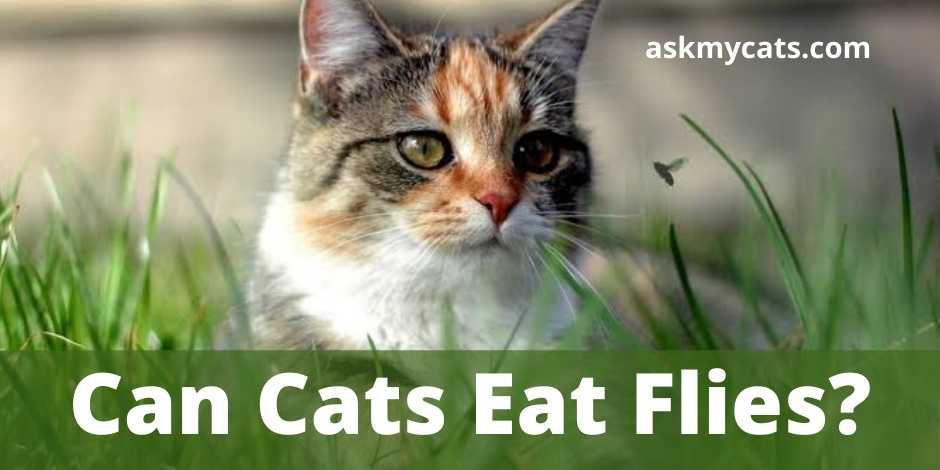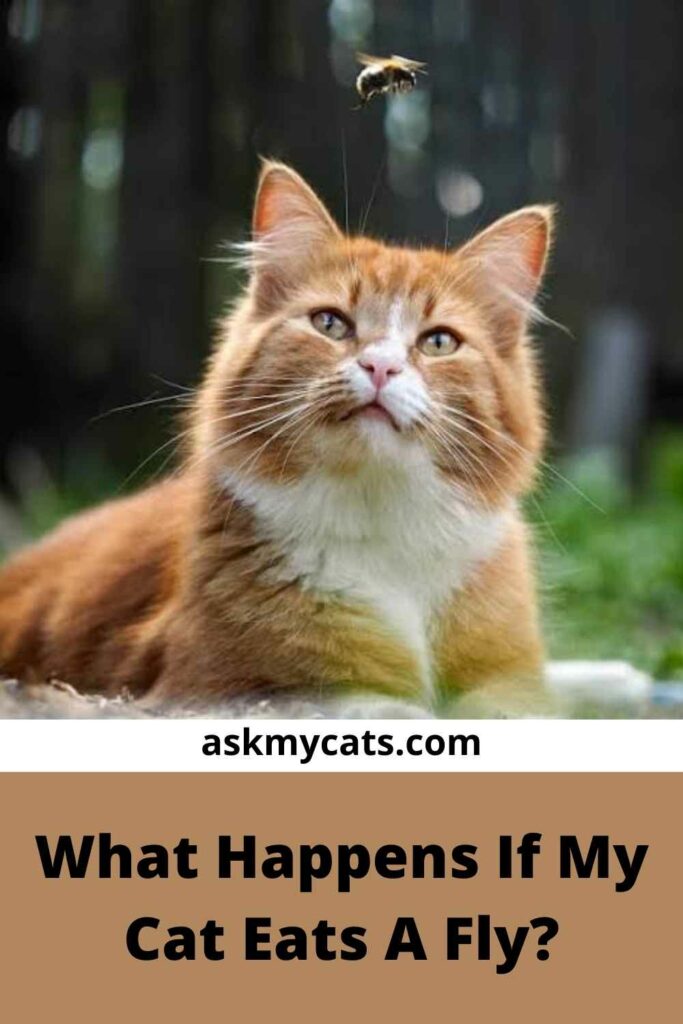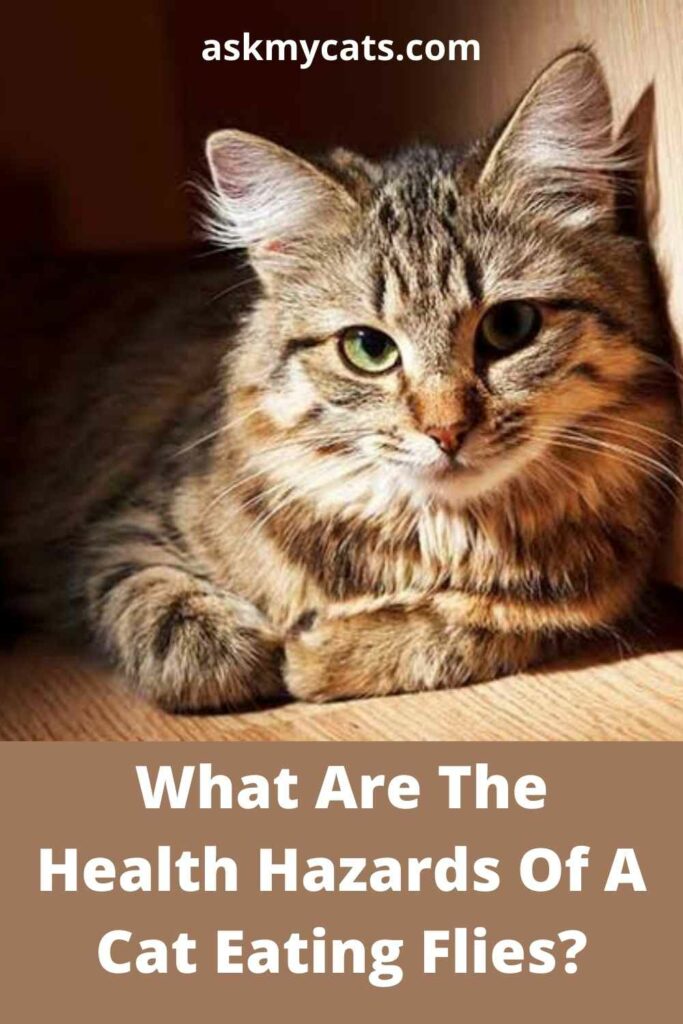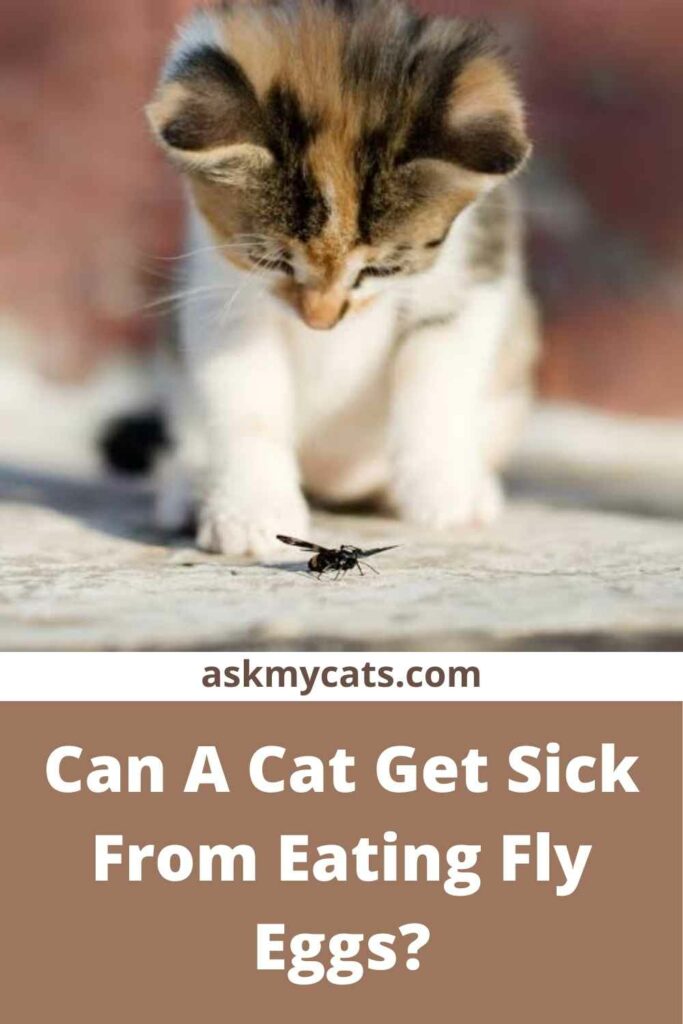Yes, cats can eat flies. Flies, like many other insects and pests, are not immediately hazardous to cats. Only if the fly is currently harboring an ailment that it can pass on to your cat, or if it has been polluted with harmful pesticides, can problems emerge.
The stomach of a cat can eat and digest a wide range of foods, even flies. However, some cats’ stomachs are more sensitive than others.
Eating flies may occasionally induce moderate stomach distress, such as vomiting or diarrhea, as well as a brief loss of appetite.
When a fly lands on a polluted surface, it may carry bacteria, protozoa, and other organisms on its legs, which it may then transmit to the cat when it consumes the fly.
As a result, if a cat continues to consume flies, it is more likely to fall ill. When a fly comes into touch with toxic insecticidal chemicals, there is a chance that the pesticide will be transferred to the cat when it consumes the fly, especially if a large number of flies are consumed at once.
If you want to learn more about the effects of eating flies by your cat, keep reading!


Give Your Cat the Perfect Day
Get the Free Ebook!
Why Does My Cat Keep Eating Flies?
There’s nothing to be concerned about if your cat eats a fly on a rare occasion. Flies are a natural cat activity and a wonderful source of exercise for your cat’s eye-paw coordination and cognitive stimulation.
If she does it on a regular basis, however, you should take steps to avoid it by keeping your home fly-free, as eating flies can cause health problems like gastrointestinal infections.
Cats consume flies mostly because they are natural hunters that are intuitively evolved to chase everything that moves. Most of these creatures’ inherent instincts haven’t been lost, including their intense hunting drive.
Cats, being natural hunters, are drawn to items that move in erratic patterns. If the cat is successful in catching a fly, it may as well consume the bug. After all, the whole point of hunting is to consume the animal.
Cats pursue flies for a variety of reasons, one of which is that the bugs are the ideal entertainment for cats.
Swatting flies is a challenging task. Even though your feline pal is an extremely adaptable creature, catching a single fly may take hours. However, the cat likes it that way.
While a fly perches on and leaps off surfaces at random in order to escape getting captured, the cat thinks the fly is having fun.
As a result, the kitten will continue following the fly until it either captures it or the fly fades totally from view.
Do Cats Like Eating Flies?
Flies are a delicacy for cats, therefore they generally devour them. They’re similar to animal proteins.
In human words, it’s like having french fries or hash browns with your main meal. For cats, it’s bugs and flies.
Cats are also carnivores, and they can’t say no to meat treats. These bugs and flies, according to certain animal nutrition specialists, also aid in improving nutrition and immunity. For both wild and domestic cats, it accounts for one-third of their diet.
Should I Worry If My Cat Ate A Fly?
Cats are natural predators, and it is in their nature to hunt for prey, just as their ancestors did, and domesticated cats retain this capacity.
Take, for example, your beloved cat. She will chase after every moving object she may see, including little animals like ants and spiders. Flies, grasshoppers, and even bees are among the flying creatures that your cat will joyfully follow.
While some cats will show their prize to their owners, most cats will consume their prey, especially if it is a little fly or insect.
If your cat just eats flies on occasion, there’s no need to be concerned. Cats may use catching flies as a kind of exercise to improve their eye-claw coordination as well as excite their curious minds.
If your pet cat does it on a regular basis, though, you should take steps to prevent it.
This is because some cats’ stomachs are sensitive, and consuming a large number of flies might result in vomiting, diarrhea, and a loss of appetite. Eating flies as part of her regular snacking might result in illness and life-threatening health problems.
What Happens If My Cat Eats A Fly?

Leave your cat alone if fly chasing and eating is merely a once-in-a-while activity for her. It can be a healthy exercise for your cat at the absolute least since it sharpens her eye-paw coordination and stimulates her brain.
Apart from the flies, the only major fatalities are figurines, vases, and anything else that isn’t glued or bolted down, as well as the blinds and drapes.
Whether there are flies or not, make sure your cat’s immunizations, deworming, and flea treatment are up to date at all times to help her immune system fight off most illnesses.
Although it is typically not hazardous to cats to eat flies, we do not advocate encouraging them to do so on a regular basis. Having a lot of flies inside the house or in the yard can cause hygienic concerns, thus steps to keep flies out should be taken.
You may install screens and store garbage in lidded containers. If your cat appears to be unhappy in the stomach, keep an eye on him and hand feed tiny quantities of wet food and water.
The following are the most likely dangers of your cat consuming flies on a regular basis:
- Flies contain germs and other organisms that can put your cat’s health in jeopardy.
- Poisonous pesticides may have gotten into touch with the flies, and there’s a chance it’ll be passed on to the cat.
- Eating flies can cause gastrointestinal parasites like Isospora, which can cause bacterial infections in the intestine.
- Fly bites may also be a problem for your cat. If your cat walks outside, insects such as the botfly may deposit eggs on her skin, which develop into maggots and cause skin diseases.
Also, keep an eye out for indications like leaking saliva from the lips, difficulty breathing, or a loss of body coordination in your cat.
These are indicators that she may have been poisoned since the flies she ate may have been exposed to pesticides. Take your beloved cat to the veterinarian right away for treatment.
Can Eating Flies Make Cats Sick?
Yes, cats may get sick from eating flies. If your cat appears to be unhappy in the stomach, keep an eye on him and hand feed tiny quantities of wet food and water.
If your cat has a little stomach irritation from eating flies, the symptoms should go away in twenty-four hours and she’ll be back to her naughty self.
Take your cat to the veterinarian as soon as possible if the indications of stomach distress last longer. She might have a bacterial infection or protozoa in her gastrointestinal tract that has to be treated.
Always be on the lookout for indications of poisoning in your cats, such as leaking saliva from the mouth, difficulty breathing, or lack of coordination. If any of these symptoms develop, take your cat to the veterinarian right once and, if possible, carry insect poison with you.
Use physical means to keep flies away from your home rather than insecticides and other chemicals to reduce the risk of poisoning. If pesticides are absolutely necessary, use organic-based, pet-friendly insecticides.
Can Cats Get Worms From Eating Flies?
Yes, cats are capable of getting worms from eating flies. Several fly species have been linked to the transmission of potentially harmful worms.
Tapeworms and Physaloptera are examples of these worms.
These infections may cause your cat to become ill, since your cat may contract worms as a result of ingesting them.
In addition to the diseases mentioned above, certain flies can also transfer viruses to your cat.
Can Flies Lay Eggs On Cats?
Yes, flies are capable of laying eggs on cats. Several fly species have been linked to the transmission of potentially harmful worms.
House flies deposit eggs in the diseased skin wounds of animals. The mending stub of the umbilical cord in newborn kittens is an appealing egg-laying location for flies.
In elderly cats, bite wounds are frequently the source of infection. These flies are also attracted to matted hair coats that have been polluted with excrement.
Maggots are born from eggs placed in contaminated hair coats and spread quickly to any infected lesion. The larvae immediately infiltrate the surrounding tissue once inside a wound.
These infections may cause your cat to become ill, since your cat may contract worms as a result of ingesting them.
In addition to the diseases mentioned above, certain flies can also transfer viruses to your cat.
What Are The Health Hazards Of A Cat Eating Flies?
In general, the following are the primary health concerns associated with cats eating flies:

1. Eating Excessive Flies
It’s tough to determine the exact quantity of flies that cats should avoid eating. Most cat owners discover that their feline pals have eaten too many bugs when it is too late.
If your cat eats more than its fair share of flies, it may suffer from a variety of gastrointestinal problems.
Nausea and vomiting, diarrhea and dehydration, stomach discomfort, and tiredness are the most frequent symptoms to be aware of.
It’s worth noting that these problems don’t always suggest that the insects consumed are poisonous. Instead, they imply that the cat’s digestive system has been exposed to an unusual meal for the first time.
Even if your cat doesn’t have any digestive problems as a result of eating a lot of flies, you should still be worried as a pet parent. A cat that eats too many flies may be undernourished.
2. Consumption Of Contaminated Flies
Most individuals in areas where the fly infestation is endemic use pesticides or insecticides to try to get rid of the bugs.
Several pesticides are quite efficient against flies. Unfortunately, just a few of these goods are designed specifically for cats.
You will not succeed in exterminating the flies unless you treat your house or yard using pet-safe pesticides. You may also be exposing your cat to the chemicals included in these items.
Pesticide poisoning symptoms include nausea, vomiting, and diarrhea, as well as lethargy, hypersalivation, and loss of appetite.
Cats exposed to infected flies may die in the worst-case scenario, depending on the strength of the insecticides employed.
What makes eating infected flies extra hazardous for your cat is that there will be a lot of them floating around. As a result, your cat may consume several of them, exposing itself to the pesticides’ poisons.
As a good pet parent, you should arrange an appointment with your veterinarian as soon as you detect any of the symptoms listed above.
3. Consumption Of Pathogen-Carrying Flies
This is, without a doubt, the most serious danger linked with cats eating flies.
Worms are one of the most frequent diseases that your cat may come into contact with after eating flies.
Therefore, keep an eye out on your cat and stop her if she starts consuming too many flies.
Can My Cat Get Maggots From Eating Flies?
Maggots are the result of a fly laying its eggs on your cat’s open wound or inflamed skin. If your cat eats flies, she is unlikely to catch maggots.
However, ingesting maggots can still cause myiasis, which is a maggot illness. Therefore, you should prevent your cat from eating flies as it may be hazardous to her health.
Also, check out about maggots in cat food
Do Flies Lay Eggs On Cat Food?
Maggots in cat food are a seasonal occurrence that affects cats during the summer months when there are adult flies around.
It might be tough to keep a cat’s food fresh at any time of year, but in the summer, flies can be a problem. Some cats only eat wet food and prefer to graze throughout the day rather than consume all of their meal at once.
In the heat, exposed food degrades faster. Flies that lay eggs on your cat’s food are also attracted to it. So, flies can lay eggs on your cat’s food.
What Happens If A Cat Eats Fly Eggs?
If your cat eats food that contains fly eggs, it may become afflicted with the disease that the maggot spreads. There’s also a chance that nothing will happen.
It is recommended that you keep your cat secure from maggots and clean the area where she lives. Keep a watch out for changes in behavior or diarrhea if your cat ate any maggots.
Can A Cat Get Sick From Eating Fly Eggs?
Yes, a cat may get sick and get the following health problems from eating fly eggs:

1. Myiasis
Maggots infesting and feeding on the live tissue of animals or people produce myiasis, a bacterial parasite. The nations that are most affected are those that are tropical or subtropical.
Larvae can lodge in regions of the mouth when hygiene is poor. Myiasis is a disease that affects dogs, cats, rabbits, and animals such as lambs and cows. Myiasis is not a contagious disease.
Myiasis in the gastrointestinal tract causes stomach discomfort, vomiting, and diarrhea. In most cases, the larvae may be seen in the mouth.
2. Bacterial Poisoning
Consumption of maggots or maggot-infested food can result in bacterial poisoning. Ingesting most maggot-infested foods is dangerous, especially if the larvae have come into touch with feces.
Certain houseflies use animal and human feces as breeding grounds. Garbage and rotting organic waste are also nutritious food sources for them.
Maggots can also be infected by Salmonella enteritidis and Escherichia coli bacteria. An E. Coli infection causes fever, diarrhea, nausea or vomiting, and cramps.
Salmonella symptoms are similar to E. Coli’s symptoms. Bloody stools and fatigue are possible side effects of both diseases. As a result, it’s possible that maggots will appear in cat food.
3. Allergies
In certain cats, maggots can trigger allergic responses. Cats with respiratory and asthmatic symptoms have been reported by people who handled such larvae for use as live fishing bait or who are occupationally exposed.
Touch dermatitis has also been reported in certain cases.
It has been suggested that eating larvae that have been exposed to or eating items that your cat is sensitive to may cause an allergic response.
How To Keep Flies Away From Your Cat?
If your cat sees flies flying and buzzing around, there’s a good chance she’ll chase them down and eat them.
Here are some methods for keeping flies away from your cat and your home:
- Put roof vents and install screens on windows and doors to keep the bugs out.
- To keep flies away, use basic housekeeping techniques such as properly cleaning and disposing of rubbish, and making sure trash bins are well-covered.
- Clean up after your pets and properly dispose of their trash and excrement in your yard and house.
- To keep flies away, use fly traps and citronella candles.
How To Prevent Your Cat From Eating Flies?
Apart from keeping your house and premises clean and fly-free, there are a few more things you may do to distract your cat from flies:
1. Give Your Cat Plenty Of Food
Even if you feed your cat well, it may still chase flies. Even if it is successful in capturing the insects, it will be unable to devour them.
2. Add Screens To Your Doors And Windows
Screen doors and windows let in light and air while keeping flies and other insects out.
3. Do Not Keep Food Out In The Open
This is another technique to keep flies away from your house.
Remove any food that has accumulated on your table, exposed shelves, or in your cats’ bowls. Dispose of all animal excrement and other decaying materials in well-sealed rubbish containers in the same breath.
4. Use Insecticides That Are Safe For Your Pet
If you must spray your home or yard, look for pesticides and insecticides that are safe for pets.
5. Encourage Your Cat To Be Active
Give your cat toys that she can chase to relieve her predatory impulses, such as feather toys, to divert her attention to safer items to gnaw on.
Make sure your pet cat has enough engaging play so she doesn’t grow bored.
Install a cat perch, catio, or cat shelves for her to explore so she can stay active and avoid chasing flies.
Aside from these precautions, you could want to purchase your cat a toy that looks like a fly. Make sure your pet has regular vaccinations and deworming treatments.
Frequently Asked Questions
Are House Flies Harmful To Cats?
House flies are generally not harmful to cats. Cats like catching flies, but they can also be a nuisance. Fly bites on the ears are a problem for some cats, especially those that reside outside.
Will Eating Flies Hurt Cats?
No, eating flies will not hurt cats in general. The stomach of a cat can ingest and digest a wide range of foods, including insects. However, it might induce minor stomach discomfort, such as vomiting or diarrhea, as well as a brief lack of appetite.
Is It Safe To Eat Food If A Fly Lands On It?
If a fly flies on your food and you swat it away immediately, the food is probably safe to consume. The longer a fly stays on your meal, the more likely it is to pick up dangerous germs, viruses, and parasites.
Final Words
At any one time, your cat’s predator instinct shows itself by pursuing rodents, smaller creatures, or even flies. Some cats will consume flies just at particular periods of the year, while others will eat them on a regular basis.
There’s nothing to worry about if your cat eats a fly once in a while, but if she does it on a daily basis, you should try to break the habit by keeping your house fly-free to protect your cat’s health and well-being.
Cats can consume a variety of different types of flies, so there’s no need to panic.
However, if your feline eats more flies than it should, or if the flies are polluted with diseases or pesticides, issues may emerge.
If your cat enjoys chasing the fly on rare occasions, leave it alone. Consider it a fun activity for your cat. It boosts the body’s circulation and stimulates the mind.
However, if you notice that your pet cat is consuming more flies than usual, you should intervene as quickly as possible to stop it.
If you have any doubts or questions regarding your furry friend’s habits, drop them in the comment section below!
